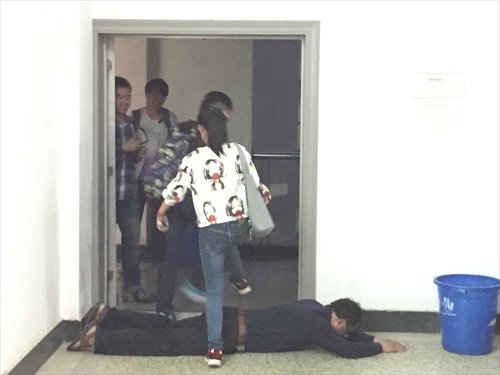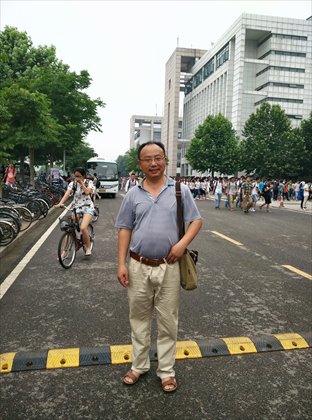Professor tries to encourage critical mindset among students

A student steps over Zhang Nengli. Photo: Courtesy of a student surnamed Wei
When associate professor Zhang Nengli ended his course this semester, he made a surprising request: he asked his students to step over him while he lay face down on the ground.
In the evening of May 11, Zhang gave the last lesson of his elective course, Thoughts and Strategies to Solve Problems, to about 150 students at the Wuhan University of Technology (WHUT). After class, he lay down in front of a doorway and encouraged the departing students to step over him. Zhang said he wanted his students to learn to never submit to any power or any person, only the truth.
"In Chinese culture, there's a custom of 'being afraid of people' which prevents us from thinking freely. Even when the other side has made an obvious error, we dare not confront them," Zhang told the Global Times, saying his students always kept silent and seldom questioned him in class.
Stunned and confused, the students were initially reluctant to stride over the prostrate Zhang. Despite his encouragement, only a quarter of the students did so. The others chose to leave the classroom through the back door.
To explain his reasons for making such a "sacrifice," Zhang mentioned a video that went viral in China in April.
In the video, Nancy Kanwisher, a neuroscientist at the Massachusetts Institute of Technology, cut off her shoulder-length hair and asked an assistant to draw on her head to show the structure of the human brain.
"I was very impressed by the professor. I want to prove that Chinese teachers can also make similar efforts," he said.

Zhang Nengli Photo: Courtesy of Zhang Nengli
A step ahead
Soon after his unusual class was reported on by the media, the 51-year-old Zhang and his teaching methods were caught up in controversy.
In commentaries published on news portals and in posts on social media, some applauded his devotion to teaching, while others characterized his lesson as a publicity stunt and questioned its effectiveness.
The views among Zhang's students were also mixed.
"I appreciate his thoughtfulness and accept the idea he wanted to pass to us, but I didn't go so far as to walk over him," said a student surnamed Wei.
Some said they are proud of having such a teacher. "He didn't lose his dignity by receiving students' 'insults,' but earned their respect and admiration," a student surnamed Chen told the Wuhan Evening News.
Others were less positive. "I think it's ridiculous. I would never stride over a person intentionally. Insulting someone is cowardly, not rebellious," a student told the Global Times on condition of anonymity. "Questioning authority doesn't require such a ritual."
Zhang didn't expect such heated debate over his approach. But he revealed that it was not the first unorthodox exercise in his class and will not be the last.
Thoughts and Strategies to Solve Problems is a course he created last September for sophomores, aiming to improve their ability to solve practical problems by using critical thinking.
Zhang said he has tried to be innovative to make his lectures interesting. He has brought oranges to class to reward students who had challenged his demonstration in the previous class, used glasses of water to have the students experience visual deception and even wore his clothes inside out to test the students' powers of observation.
Agreeing with eminent mathematician George Polya's assertion that "A wise teacher is an excellent actor," he said he would consider putting on more performances in future lectures.
Truth to power
First employed by WHUT's School of Computer Science and Technology in 1996, Zhang is accustomed to speaking truth to power.
In 2005, noticing that senior students were performing poorly in programming, he wrote a letter to the university's leaders, in which he proposed a revision of the teaching schedule and the establishment of a new system to assess graduates' competence. The school eventually invited Zhang to a special meeting to address the problem.
In 2006, the university started to deduct 3 percent from research funds for water and electricity charges from all fund recipients. Many teachers complained about the new policy as they didn't use the university's facilities to do their research. But Zhang said only he stepped up and argued with the university's officials. Finally, the university stopped deducting the money.
"The Chinese are too obedient to people, from parents and teachers to leaders. This is a national defect. In order to compete with other nations, we have to make changes," Zhang said, adding that in the US, citizens even dare to throw tomatoes at their president.
He also publicly disagrees with the idea of inheriting one's cultural legacy wholesale. Since 2008, he has posted more than 460 blog entries on sciencenet.cn, a website run by China Science Daily. In many entries, he asserted that a number of Chinese cultural deficiencies are hindering Chinese people from embracing critical thinking and technical innovation.
From timid to tough
Though a critical person now, Zhang was very timid when he was young.
Born into a poor farmer's family in Hong'an county, Central China's Hubei Province, he was afraid of his father for a long time, even after he got married. His father, a high-school graduate and skilled carpenter, wielded absolute power in the family.
Zhang said he never confronted his father, even when he was wrong. In any disputes his family had with neighbors, his father would ascribe all of the fault to the other side. "My father hadn't taught me to see things rationally, only in his own way," Zhang said.
In 1980, Zhang was admitted to a normal college. After three years of study, he became a physics teacher in a high school in Hanyang county (now Caidian district in Wuhan) in 1983.
In 1986, he passed his examinations and was admitted to Wuhan University. But the Hanyang education bureau refused to release him from his post. At that time, it was common practice for employers to do so, as well-educated talents were rare. However, Zhang didn't surrender but chose to fight back.
One day, he went to the bureau's office, cut one of his fingers, wrote "hunger strike" on his coat with his blood, and began his silent protest. Hours later, the bureau agreed to let him go to university.
In 1991, he completed his studies for a master's degree in Wuhan University. "After studying modern mathematics and sciences, I gradually developed a sense of objectivity and broke the barriers set by my father," he said.
Newspaper headline: Thinking out of the box